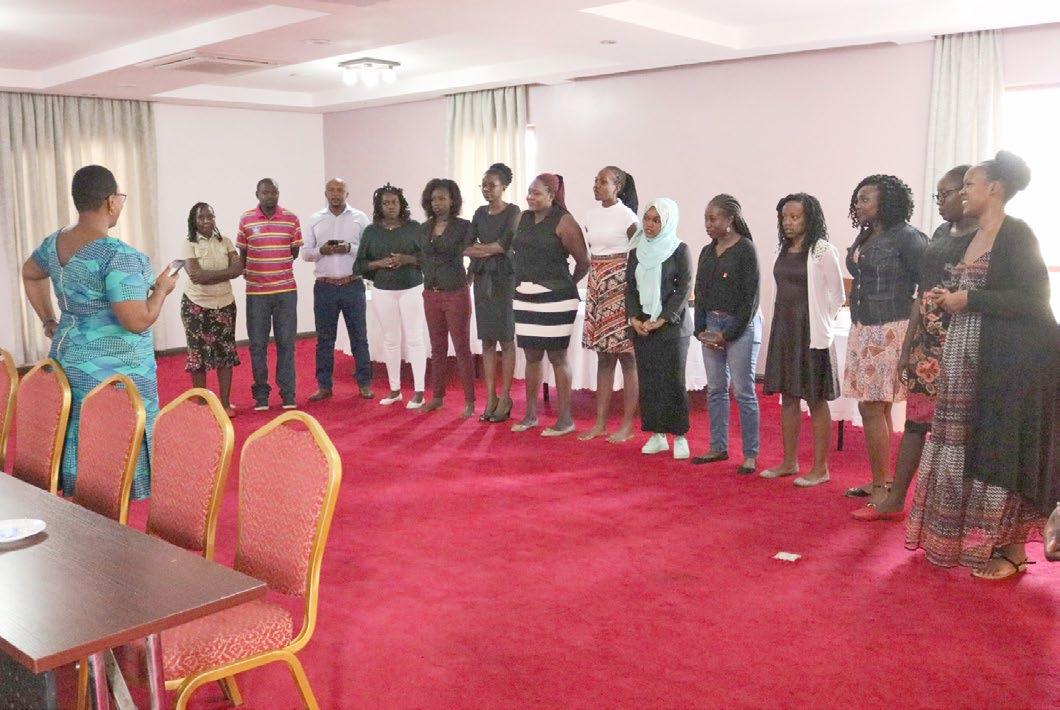
4 minute read
Youth Adult Partnerships to end teenage pregnancies
from Editorial Design
by Ben Kanyi
A story of ADS Nyanza In Homa-bay County
40%
Advertisement
Narok County
33% Homabay County 29%
Teenage pregnancy has been a persistent problem in Kenya for some time now. KDHS 2014 highlights it as a crisis in Narok, Homabay and West Pokot among other counties in Kenya. According to the survey, Narok leads at 40% followed closely by Homabay at 33% then West Pokot at 29%. As Kenya struggles to lower the age of consent to 16, rates of teenage pregnancy continues to grow. Infact, a recent report from the DHIS shared by Homabay County RMNCAH Coordinator shows that the figures have shot to 43% in 2017 among all the ANC attendance in Homabay and 46% in 2018 among all the ANC attendance that year. The immediate former Chief Justice Dr. Willy Mutunga described the problem as a burgeoning crisis going by the case loads on defilement alone. It is against this backdrop that ADS Nyanza, a faith-based organization with the support from the GUSO programme moved into programming to help reduce the incidences
ADS Nyanza aimed to reduce teenage pregnancy cases presented in 2017 by 25% by end of 2018. They made use of a number of strategies including; Capacity building of youth advocates, Radio talk shows-at EK FM, SMS platform, Community dialogue, Community paralegals and sharing of lessons learnt with GUSO partners (FHOK, NAYA and KMET).
25%
In percentage the ADS Nyanza aimed to reduce teenage pregnancy cases presented in 2017 by end of 2018
GUSO initiative reached 5223 young people 2307 males
2916
Females
ADS-Nyanza was deliberate in involving both youths and adults in the GUSO program irrespective of background, affiliation or disability. The implementation process began with identification and training of youth advocates on ASRHR and MYP with support from SIMAVI. The organization further identified key influencers and trained them together with the youth advocates on Youth Adult Partnership. This resulted in joint partnerships through which EK FM offered free airtime for a joint talk show by community paralegals and youth advocates on SRHR every Thursday. The talk shows have been key in providing critical SRHR information to young people to enable them make informed reproductive health choices. Key topics on the show have been teenage pregnancy, condom use, contraceptives and decision making. This initiative reached 5223(2307 males, 2916 females) young people Community dialogue forums brought together key decision makers and youths drawn from across the island. Some of the key decision makers have been the Sub-county RH Coordinator - Mbita, the resident magistrate Mbita Law Court, All health facility in-charges in Mfangano ward, Ward PHO, the police, the assistant County commissioner, faith leaders amongst others. The dialogue were key in coming up with key strategies of addressing the menace, they also increased vigilance and mapping of pregnant teens. Youth advocates have since come up with young mothers’ sessions where they are empowered on life skills and contraceptives. As a result, 57 young mothers were taken back to school in 2017 and 2018. Dialogue were used as a forum to review progress and chat way forward on key challenges faced by young people.
57
young mothers were taken back to school in 2017 and 2018 due to young mothers’ sessions
From the dialogue, community paralegals and Mbita law courts gave the issue a legal approach. As a result, the Mbita Law Court as a member of the Court Users Committee conducted sensitization forums in Sena, Ugina, Remba, Ringiti, and Takawiri beaches on teenage pregnancy/defilement as an SRH issue with a legal touch. Faith leaders intensified SRHR information dissemination to well upto 2816 (1518 females: 1298 males) drawn from the Island. Facility in charges at Ugina, Sena and Wakula health centers committed to and have come up with adolescent days held once a month and reached out to a total of 1287 youths ( 786 females: 501 males) with key information on contraceptives. This joint partnership resulted in reduction of teenage pregnancies in Mbita sub-county, Mfangano ward. Overally, there was drastic reduction in teenage pregnancies recorded in Mfangano ward from 311 in 2017 cases down to 176 in 2018 and a significant drop in Mbita from 46% in 2017 to 29 % in 2018 and from position 5 in the county in 2017 to position 8 in 2018 out of the 8 sub-counties (DHIS). This shows that these efforts have created a significant change and more inclusive forums (dialogues) are key.

CHALLENGES
Low contraceptives uptake among adolescents due to opposition from parents
Low socio-economic status making adolescents vulnerable to sex predaators
Catholic Church position on contraceptives vs. its dominance in Mfangano Island.
Access to information is key in addressing the most teething reproductive health problems such as teenage pregnancy.
When youths are involved in solving their own problems, the resultant change is magical i.e. from 311 to 176 cases in span of 1 year.
Teenage pregnancy is a multi-sectoral issue that needs joint approaches: health and legal to address as in the case of Mfangano Island.










